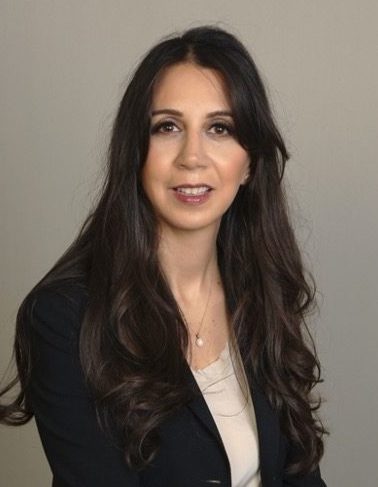No two career paths are exactly the same, especially in the legal field. Lema Khorshid, founding partner of Fuksa Khorshid Law Firm, is no exception to this and has paved a remarkable career for herself. Lema graduated from the University of Illinois Urbana-Champaign in 2000 with dual degrees in Finance and Marketing, as well as a concentration in International Business and Italian.

Lema then received a Juris Doctorate (JD) from Loyola University Chicago School of Law in 2004. After receiving her JD, she worked at a big law firm. In 2006 she decided to start her own law firm with two close friend and established Fuksa Khorshid LLC, a real estate and intellectual property (IP) law firm, where she currently practices.
I recently had the privilege of speaking with Lema about her journey on co-founding her own law firm.
The following is an edited version of our conversation with brackets to indicate my own words that further explain some legal/IP terminology for those who may be less familiar.
How Did You Begin Your Legal Career?
I never really wanted to be a lawyer. After graduating from the University of Illinois at Champaign-Urbana, I worked in international marketing and consulting for various fashion brands. Prior to that, I had the opportunity to live, work, and study abroad in Italy. I also later worked in fashion show production and marketing for mass-market brand lines. After years in the fashion industry, I started experiencing feelings of burn out. I thought a legal career could be what aligned best with the strong communication skills that I developed.
How Did You Go from Law Student to Being a Partner at Your Own Firm?
When I was in law school, I thought I wanted to do litigation. Then, while I was in law school I clerked in-house for a lawyer at the National Academy of Recording Arts and Science, the organization best known for the Grammy Awards. It was here that I saw how efficient an in-house lawyer was at representing a client. After I received my law degree, I worked at a big law firm for less than two years and realized that I was unfulfilled. So, in 2006 I started a law firm with two close friends who had been practicing attorneys.
What Type of Work Are You Doing at Fuksa Khorshid?

Mostly counseling related to intellectual property for middle market businesses. The work that I do at Fuksa Khorshid, LLC is largely client service oriented, which I find is the most rewarding. I protect the legal assets of business owners by providing them with foundational IP strategies [plans for how a client should protect and leverage its unique IP assets to achieve their overall business strategy], put out daily “fire drills” where necessary, and advise clients on commercializing intellectual property rights namely in trademarks, trade secrets, and copyrights.
What Advice Do You Have for Current Law Students?
The five key pieces of advice I can offer for aspiring IP lawyers are: 1) find ways to develop your emotional intelligence; 2) understand business law; 3) self-exploration is critical to finding a fulfilling career; 4) hone your communication skills; and 5) be proactive about your career search. But above all things, fulfillment and impact are what’s most important because you will spend a lot of time practicing law.
What is Emotional Intelligence? And Why is It So Important for Attorneys to Develop?
A huge thing I look for when hiring new lawyers is emotional intelligence (EQ). Honing your EQ skills is a great way to differentiate yourself once you graduate. EQ is an incredibly valuable tool for being a great lawyer. Of course, law school is a time to focus on grades and extracurriculars but developing soft skills [e.g. communication and leadership skills] and understanding how to work with people is what sets most candidates apart. Soft skills are often over-looked and under-sold in law schools. However, in practice, clients don’t tend to gravitate toward or stay with the smartest attorneys unless they have the EQ to match. Clients are drawn to attorneys that they enjoy working with, who exude compassion and empathy. Other skills, like public speaking and writing skills, are skills that most attorneys can quickly master in their first few years after law school. The practice of law is about delivering great client services. EQ is just as important as IQ. The difference is you can’t train for EQ. You can train any smart person on how to write a response to an office action, but you can’t train for EQ in the same way. It’s up to each of you to seek out resources and experiences that will teach you how to understand and manage emotions to better develop professional relationships.
What Classes Do You Recommend Students Take When Interested in an IP Career?
Before entering the workforce as an IP attorney, I recommend that all students seek as many corporate and business law-related learning opportunities as possible. The best advice I ever received from a mentor during law school was, “If you’re going to do this [work in IP], don’t just take IP classes. Take estate planning classes. Take corporate law classes.” It may be tempting to sign up for every class related to IP and avoid branching out to other areas like estates, securities, and transactional law, but you need a well-rounded perspective. However, adding these areas to your legal course work helps one to understand and anticipate clients’ business strategies and needs. Loyola has an amazing variety of course offerings. Failing to take advantage of them as an aspiring IP attorney would be doing yourself a grave injustice.
Do You Have Any Suggestions for How to Find a Fulfilling Career?
The more you know yourself (truly know yourself!), the more likely you’re going to find the right opportunity for you. A lot of students enter law school with tunnel vision. They think they already know what they want to be. My career path leading up to law school [i.e. her fashion background] and my open-minded attitude about different practice areas gave me a more well-rounded career search. I was able to understand my talents and passions.
I encourage other students to take a similar introspective and open-minded approach so that they also find fulfillment in their careers. Be open-minded to figuring out your passion and your talents. Your passion is great, but what is your talent? Does your passion really overlap with your talent? Taking steps to understand yourself and your strengths, even if you’re sure of the path you’d like to take, helps sift through opportunities to find what will be the most fulfilling and enriching to you.
What Suggestions Do You Have for Breaking into the IP Sector After Graduating?
Don’t expect career services to drop a great job in your lap. Get out and find one. Be comfortable with meeting people and asking for help. Being proactive, affirmatively seeking out opportunities, and taking control of your career ensures that you will create the career journey that is best for you. You can’t be passive about the most important adventure of your life. Network!
Networking is an uncomfortable experience for many people. However, it is a critical part of a great career. The people who have the richest and most successful careers aren’t always the ones at the top of the class. They are those who are willing to seek out the opportunities that are best aligned with their passion and talents. They also work hard for their opportunities. There is no substitute for an open mind, hard work, and proactivity.

AJ Gordon
Associate Blogger
Loyola University Chicago School of Law, J.D. 2026
